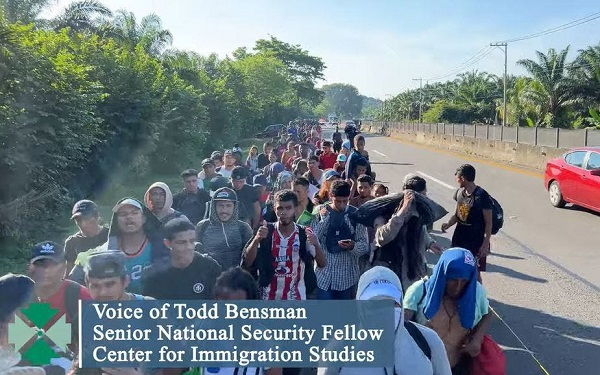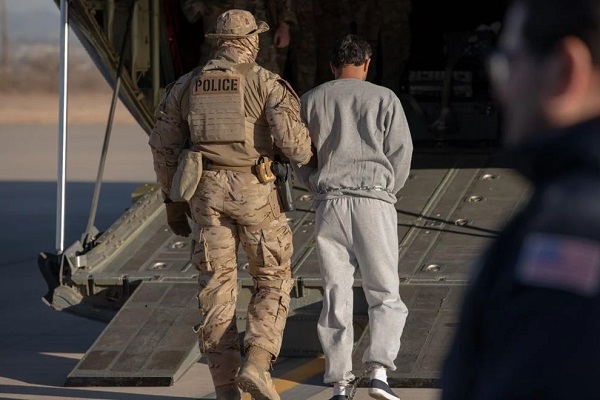illegal immigration
Over 150,000 migrants marching in Mexico, await the outcome of the US Election

From The Center for Immigration Studies
By Todd Bensman
Washington, D.C. (October 24, 2023) – Recent Center for Immigration Studies field work reveals a growing crisis in the Mexican southern state of Chiapas.
Why are thousands of migrants bottled up in this area near the Guatemala-Mexico border, and why are caravans forming but only moving within Chiapas?
On-the-ground reporting by Todd Bensman, the Center’s national security fellow, highlights the impact of the Biden-Harris administration’s December 2023 deal with Mexico and the potential consequences leading up to and following the U.S. election.
|
|
Key findings:
Biden-Harris Agreement: In December 2023, the U.S. and Mexico reached a secretive deal to keep migrants in southern Mexico to reduce the appearance of a border crisis in the U.S. The deal has resulted in the Mexican military setting up roadblocks in the region, particularly around the border town of Tapachula, to slow the flow of migrants.
Migrants Bottled Up: Bensman visited Tapachula, where an estimated 150,000 migrants are stranded, with 500 to 1,500 more arriving daily. The city is overwhelmed, with high poverty levels and unrest.
Caravans and Military Escorts: Migrant caravans are forming, but they are not headed to the U.S. Instead, the Mexican military is escorting them to other cities within Chiapas to ease pressure on Tapachula. Bribes and mafias enable wealthier migrants to escape the blockade, but poorer migrants remain trapped.
CBP One App: The U.S. extended access to the CBP One app, previously only usable in northern Mexico, to allow migrants in southern Mexico to schedule appointments for processing into the U.S. However, delays and limited access make it difficult for most to advance quickly.
Upcoming Election Tension: Many migrants feel an urgency to reach the U.S. before a potential change in leadership. Those interviewed fear that a Trump win would mean a closed border and no benefits, while they believe a Harris win would maintain the status quo and provide access to benefits.
COVID-19
5 Stories the Media Buried This Week

 The Vigilant Fox
The Vigilant Fox
“What is likely to happen,” Fauci says, “is the emergence of another respiratory disease.”
“It may be another coronavirus, because we know that coronaviruses, really, mostly in bats, have the capability of binding to receptors that are in humans.”
“It could be another flu,” Fauci continued. “We’re dealing with H5N1 now, which is bird flu, which has taken the somewhat disturbing step of infecting mammals, namely cows and cats and other mammals, which means it’s adapting itself more to a human.”
“So my concern, Walter, is that whenever that happens, the next outbreak will be of a respiratory disease that’s easily transmissible, that has a significant degree of morbidity and mortality,” Fauci said.
When asked if the cuts at HHS and “our attitude towards science” are making the situation “a little bit more dangerous,” Fauci replied, “Oh, absolutely!”
VIDEO: @TheChiefNerd
#4 – Dr. Oz drops bombshells on the massive waste, fraud, and abuse bleeding Medicare and Medicaid.
Oz explained that people are unknowingly signed up for coverage, illegal schemes are funneling taxpayer dollars to those who aren’t eligible, and the same patient can be billed in multiple states with no federal oversight catching it.
It also turns out that 230,000 Americans were enrolled in Obamacare plans without even knowing it.
His reaction at the end of this clip says it all.
VIDEO: @McCulloughFund
While you’re here, don’t forget to subscribe to get this top 10 list emailed to you each week.
#2 – Jenny McCarty reveals chilling encounter after speaking out on vaccine issue.
• After going public about her son’s autism and the vaccine link, Jenny McCarthy received a private visit from a man with a warning.
• He claimed to work for a top-level PR firm and said he was approached by a government agency.
• His job? To create a campaign to discredit her and label her “anti-vaccine.”
• He said he turned down the offer—because his own child had gone through the same thing.
•The man warned her that they would find someone else to do it and use the media to come after her hard.
• McCarthy was stunned and asked him to repeat everything—she said she had chills all over her body.
• When she asked why they’d attack her despite her not being anti-vaccine, he replied, “Doesn’t matter.”
• According to him, they had the media on their side and would do whatever it took to bury her message.
“We gave $13 to $15 billion a year to human traffickers. That’s what this system did,” Antonio Gracias lamented.
Gracias’ team combed through voter rolls in four states and uncovered thousands of non-citizens not only registered to vote, but in many cases, actually voted.
“We looked at the voter rolls in four states, and we found thousands of these people [non-citizens] on the voter rolls, and we found many of those people had voted. In one state in particular, well over a thousand voted.”
His conclusion?
“I think this [Biden’s border policy] was a move to import voters.”
VIDEO: @KanekoaTheGreat
Thanks for reading! This weekly roundup takes time and care to put together—and I do my best to make it your go-to source for the stories that matter most but rarely get the attention they deserve.
If you like my work and want to support me and my family and help keep this page going strong, the most powerful thing you can do is sign up for the email list and become a paid subscriber.
Your monthly subscription goes further than you think. Thank you so much for your support.
illegal immigration
Court attempts to halt Trump deportations, El Salvador president says ‘too late’

From The Center Square
By
A class action lawsuit was filed on Saturday against the Trump administration after President Donald Trump signed an executive order invoking the Enemy Aliens Act to target, arrest and remove violent Venezuelan prison gang members, Tren de Aragua (TdA), from the U.S.
The lawsuit was filed by the American Civil Liberties Union Foundation on behalf of five Venezuelans illegally in the country who were detained in Texas and New York. The lawsuit was filed in U.S. District Court for the District of Columbia.
On Saturday, nearly 300 violent illegal foreign nationals were removed from the U.S. and arrived in El Salvador with the cooperation of El Salvadoran president Nayib Bukele after reaching an agreement with Secretary of State Marco Rubio.
“The first 238 members of the Venezuelan criminal organization, Tren de Aragua, arrived in our country,” Bukele said in a post on X. “They were immediately transferred to CECOT, the Terrorism Confinement Center, for a period of one year (renewable).”
El Salvador also received 23 MS-13 gang members from the U.S. who were wanted by Salvadoran authorities, Bukele said. They include two ringleaders, one of whom “is a member of the criminal organization’s highest structure.” Those sent to El Salvador by the U.S. will help Bukele’s government “finalize intelligence gathering and go after the last remnants of MS-13, including its former and new members, money, weapons, drugs, hideouts, collaborators and sponsors.
“As always, we continue advancing in the fight against organized crime. But this time, we are also helping our allies, making our prison system self-sustainable, and obtaining vital intelligence to make our country an even safer place. All in a single action. May God bless El Salvador, and may God bless the United States,” he said.
The U.S. government is paying a small fee to detain them, Bukele said, and the prison is also making money because it requires inmates to work. These additional inmates, “combined with the production already being generated by more than 40,000 inmates engaged in various workshops and labor under the Zero Idleness program, will help make our prison system self-sustainable,” he said, noting that it costs $200 million a year to maintain.
In response, Rubio thanked Bukele saying, “El Salvador has agreed to hold the violent criminals “in their very good jails at a fair price that will also save our taxpayer dollars. President Nayib Bukele is not only the strongest security leader in our region, he’s also a great friend of the U.S.”
In an emergency hearing held on Saturday, a federal judge ruled that deportations of violent Venezuelans be temporarily halted and those who were illegally in the country and already removed be returned. The ACLU said the order blocked the administration “from deporting anyone under the Alien Enemies Act while the case proceeds. Flights carrying Venezuelan immigrants the DHS attempted to deport have been ordered to turn around and return to the U.S.”
A U.S. federal judge has no jurisdiction over foreign governments.
In response, Bukele posted on X, “Oopsie … Too late,” with a laughing emoji.
Bukele also posted videos and pictures of them arriving in El Salvador in handcuffs. The video shows them being met by El Salvadoran military wearing riot gear and transported in armored vehicles to CECOT. The videos depict El Salvadoran officials lifting up their shirts to show tattoos of gang member affiliation, officials shaving the heads of kneeling inmates and their admittance as CECOT inmates.
Today, the first 238 members of the Venezuelan criminal organization, Tren de Aragua, arrived in our country. They were immediately transferred to CECOT, the Terrorism Confinement Center, for a period of one year (renewable).
The United States will pay a very low fee for them,… pic.twitter.com/tfsi8cgpD6
— Nayib Bukele (@nayibbukele) March 16, 2025
Cooperation between the U.S. and El Salvador expanded under Trump and Rubio, representing a reversal of Biden administration policy that used taxpayer money and planes to transport illegal foreign nationals into the U.S.
Trump has been aggressively targeting of TdA after a record more than 1 million Venezuelans illegally entered the U.S. under the Biden administration, including TdA members expanding operations in at least 22 states, The Center Square first reported.
Under the Trump administration, Venezuelan repatriation flights also began, paid for by the Venezuelan government, negotiated by the Trump administration, The Center Square reported.
-

 2025 Federal Election1 day ago
2025 Federal Election1 day agoRCMP memo warns of Chinese interference on Canadian university campuses to affect election
-

 2025 Federal Election2 days ago
2025 Federal Election2 days agoConservative Party urges investigation into Carney plan to spend $1 billion on heat pumps
-

 Alberta2 days ago
Alberta2 days agoAlberta takes big step towards shorter wait times and higher quality health care
-

 2025 Federal Election2 days ago
2025 Federal Election2 days agoFifty Shades of Mark Carney
-

 2025 Federal Election2 days ago
2025 Federal Election2 days agoCorporate Media Isn’t Reporting on Foreign Interference—It’s Covering for It
-

 2025 Federal Election22 hours ago
2025 Federal Election22 hours agoResearchers Link China’s Intelligence and Elite Influence Arms to B.C. Government, Liberal Party, and Trudeau-Appointed Senator
-

 Business2 days ago
Business2 days agoTrump raises China tariffs to 125%, announces 90-day pause for countries who’ve reached out to negotiate
-

 2025 Federal Election1 day ago
2025 Federal Election1 day agoThe status quo in Canadian politics isn’t sustainable for national unity











